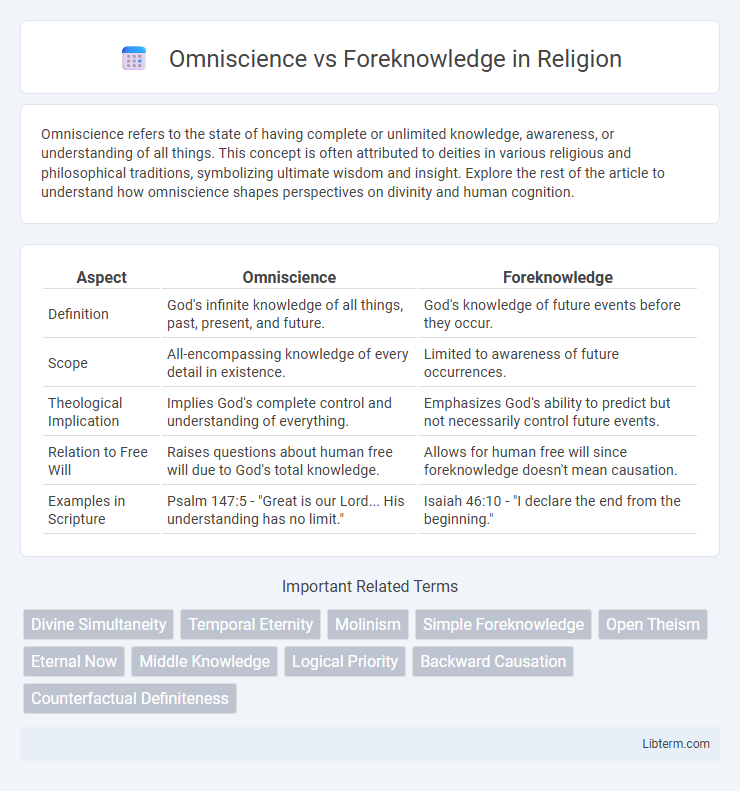Omniscience refers to the state of having complete or unlimited knowledge, awareness, or understanding of all things. This concept is often attributed to deities in various religious and philosophical traditions, symbolizing ultimate wisdom and insight. Explore the rest of the article to understand how omniscience shapes perspectives on divinity and human cognition.
Table of Comparison
| Aspect | Omniscience | Foreknowledge |
|---|---|---|
| Definition | God's infinite knowledge of all things, past, present, and future. | God's knowledge of future events before they occur. |
| Scope | All-encompassing knowledge of every detail in existence. | Limited to awareness of future occurrences. |
| Theological Implication | Implies God's complete control and understanding of everything. | Emphasizes God's ability to predict but not necessarily control future events. |
| Relation to Free Will | Raises questions about human free will due to God's total knowledge. | Allows for human free will since foreknowledge doesn't mean causation. |
| Examples in Scripture | Psalm 147:5 - "Great is our Lord... His understanding has no limit." | Isaiah 46:10 - "I declare the end from the beginning." |
Understanding Omniscience: Definition and Scope
Omniscience refers to the attribute of possessing complete and unlimited knowledge of all things, encompassing past, present, and future events without any limitations. This concept extends beyond mere awareness, implying an infinite understanding of every detail across time and space. Foreknowledge, in contrast, specifically denotes the ability to know future events before they occur, which is a subset within the broader scope of omniscience.
The Concept of Foreknowledge: Meaning and Implications
Foreknowledge refers to the ability to know events before they occur, typically associated with divine or supernatural insight. It implies a temporal awareness restricted to future events without necessarily encompassing all-encompassing knowledge of past, present, and future. The concept challenges philosophical debates about free will and predestination, questioning how future knowledge influences or limits human decision-making.
Key Differences Between Omniscience and Foreknowledge
Omniscience refers to the attribute of possessing complete and unlimited knowledge of all things past, present, and future, encompassing every detail and event without exception. Foreknowledge specifically denotes the awareness or prediction of future events without necessarily implying comprehensive knowledge of all realities or simultaneous truths. The key difference lies in omniscience being an all-encompassing, infinite understanding, whereas foreknowledge is limited to knowing future outcomes only, often within a temporal or conditional framework.
Philosophical Foundations of Omniscience
Omniscience, defined as the attribute of possessing complete, unlimited knowledge of all things past, present, and future, rests on the philosophical foundation that such knowledge is logically coherent and compatible with divine perfection. The debate often centers on whether true omniscience implies determinism or if foreknowledge can coexist with human free will, raising issues about temporal knowledge and the nature of time. Philosophers like Boethius and Aquinas argued that omniscience transcends temporal constraints, allowing God to possess timeless knowledge without negating human freedom.
Foreknowledge in Theological Contexts
Foreknowledge in theological contexts refers to God's ability to know future events before they occur, emphasizing divine omniscience and predestination. It highlights the tension between human free will and divine sovereignty, as God's foreknowledge does not necessarily imply determinism but assures believers of God's providential plan. The concept is central in debates over predestination, grace, and salvation within Christian doctrines.
Omniscience, Free Will, and Determinism
Omniscience, the attribute of knowing all truths simultaneously, raises complex questions about free will and determinism, as an all-knowing being is aware of every decision and outcome before they occur. This foreknowledge challenges the concept of free will by suggesting that human choices may be predetermined or inevitable, aligning with deterministic views where events unfold according to a fixed causal chain. The debate centers on whether omniscience implies fatalism or if free will can coexist with an all-knowing consciousness that perceives but does not cause future actions.
Scriptural Perspectives on Divine Knowledge
Scriptural perspectives on divine knowledge distinguish omniscience as God's complete and infinite awareness of all things past, present, and future, while foreknowledge specifically refers to God's ability to know future events before they occur. Biblical texts such as Psalm 147:5 emphasize the fullness of God's understanding and wisdom, affirming omniscience, whereas passages like Isaiah 46:10 highlight foreknowledge as God's declaration of future outcomes. The theological discourse considers how omniscience encompasses foreknowledge, portraying divine knowledge as both comprehensive and anticipatory within Scripture.
Impacts of Foreknowledge on Human Choice
Foreknowledge, the ability to know future events, raises significant questions about human free will and moral responsibility, as it challenges the authenticity of choices made if outcomes are already determined. The tension between foreknowledge and human autonomy suggests that knowing the future could lead to fatalism, undermining motivation and accountability. Philosophers argue that foreknowledge does not necessarily negate free will, proposing frameworks where choices remain genuinely open despite prior knowledge of potential outcomes.
Debates in Modern Philosophy: Omniscience vs. Foreknowledge
Modern philosophical debates on omniscience versus foreknowledge focus on whether an all-knowing being's knowledge includes only actual events or also all potential futures. Controversies hinge on the implications for human free will, with foreknowledge suggesting determinism while omniscience encompasses a timeless understanding of all realities. Key figures like Alvin Plantinga argue that divine omniscience must be compatible with libertarian free will, intensifying discussions about God's knowledge of future contingents.
Conclusion: Synthesizing the Debate
The debate between omniscience and foreknowledge centers on whether God's knowledge is timeless and exhaustive or limited to knowing future events without influencing them. Synthesizing this discussion reveals that omniscience encompasses foreknowledge as a subset, implying an all-encompassing divine awareness beyond linear time constraints. This synthesis highlights the complexity of reconciling divine attributes with human perceptions of time and causality.
Omniscience Infographic

 libterm.com
libterm.com